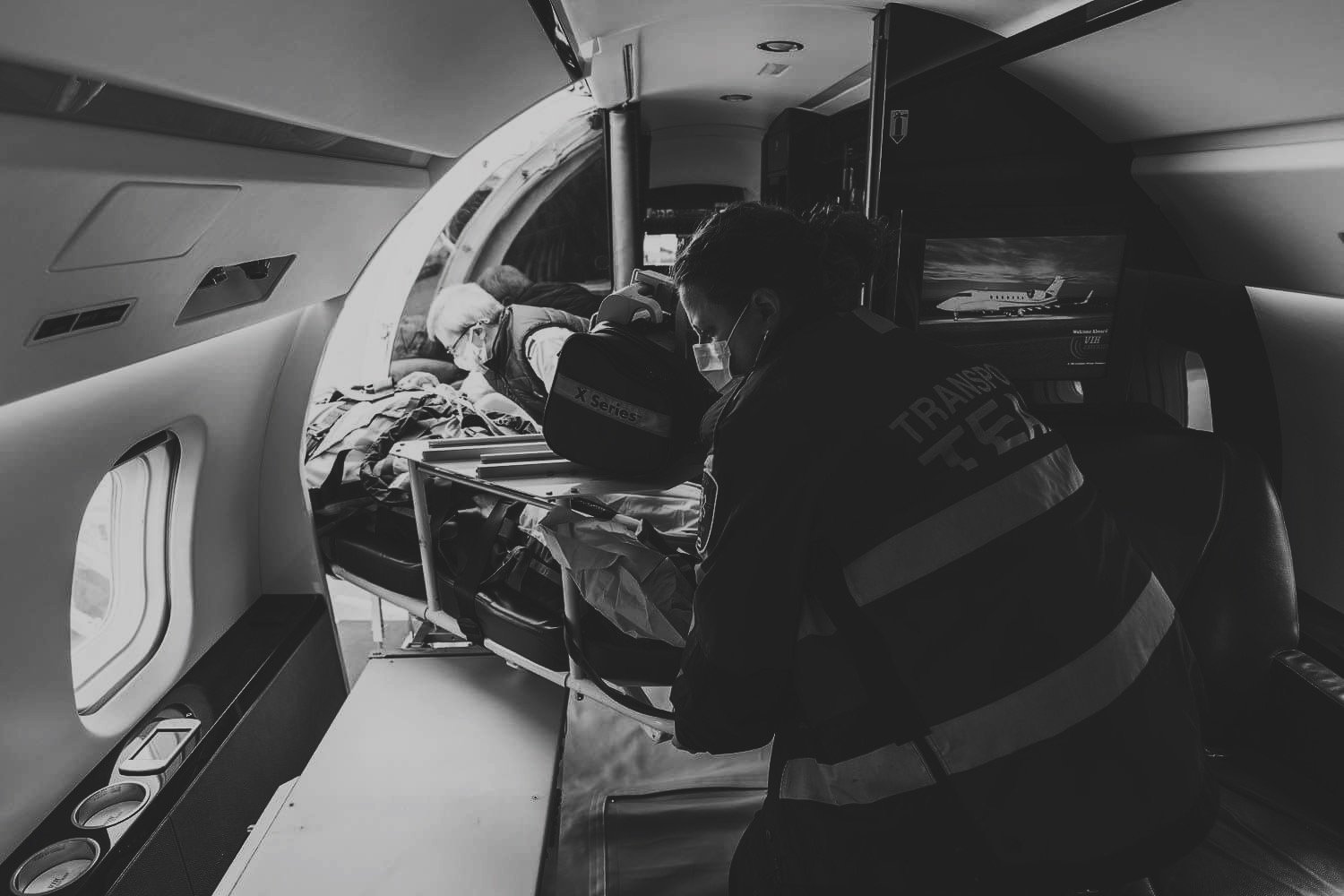
Global Medical Services
Guide to Air Ambulance Evacuations & Repatriations
Last Updated Thu 15th Dec 2022 | By Specialist Rescue Group | Reading Time: 15 minutes
Are you or a loved one facing a medical emergency while travelling abroad? Specialist Rescue Group is here to help.
Our operational and medical experts, together with our trusted and vetted providers, are able to offer western standards of care in the most austere environments at the highest levels of care for emergency evacuations and medical repatriations. Including Intensive/ Critical Care; Neonatal & Paediatric; High-Risk Pregnancy; Infectious Disease Unit (IDU); Bariatric & Organ Transplant. Our medical assistance services provide the most advanced intensive care-equipped air ambulances for the most critical of patients. We have a history of completing high-risk movements with the highest standards of expertise, anywhere in the world. For private cases, you can request a free quote here.
What is an air ambulance?
Air ambulances are aircrafts that are specifically equipped with medical equipment and personnel to transport patients who are sick or injured. In addition to patient transportation, air ambulances are also utilized for time-critical medical procedures, such as transporting organs, blood samples, or plasma, where the speed and effectiveness of their delivery can have a significant impact on the patient's survival. Various air ambulances are available for British citizens and residents who require medical transportation to meet their specific medical needs and requirements, from anywhere in the world.
What is the difference between evacuation and repatriation?
Medevac, short for medical evacuation, refers to the transport of individuals who require urgent medical attention or treatment from one location to another, typically to a hospital or medical facility. Medevac is often used in emergency situations where rapid medical treatment is necessary to save lives or prevent further injury. Medevac can be carried out using a variety of transportation methods, including helicopters, aeroplanes, and ground ambulances. The method of transport used will depend on factors such as the distance to the medical facility, the condition of the patient, and the availability of medical resources. Once the patient is stable, they can then be repatriated home via an air ambulance or commercial airline with a doctor or nurse.
Air Ambulance Repatriation
Our operational and medical experts, together with our trusted and vetted providers, are able to offer western standards of care in the most austere environments at the highest levels of care for emergency evacuations and medical repatriations. Including Intensive/ Critical Care; Neonatal & Paediatric; High-Risk Pregnancy; Infectious Disease Unit (IDU); Bariatric & Organ Transplant. Our medical assistance services provide the most advanced intensive care-equipped air ambulances for the most critical of patients. We have a history of completing high-risk movements with the highest standards of expertise, anywhere in the world.
Commercially Escorted Seated & Stretcher Repatriation
We complete both medically escorted repatriation services for commercial flights and private charters. Our operational and medical experts, working closely with our trusted and vetted providers, are able to repatriate leisure and business travellers with the best care possible - bringing you back home safely. Our team and network of doctors, nurses, and paramedics provide pre-flight, in-flight, and post-flight care; carrying bespoke medical bags with a range of life-saving equipment and drugs to ensure we are able to manage a patient with a minor condition through to an emergency situation. Portable oxygen concentrators & cardiac monitors are also available and carried when medically required.
Fit To Fly – What is it exactly?
Air travel can have a notable impact on the body. While healthy passengers may only feel minor pressure or "popping" in their ears during take-off and landing, it can cause significant difficulties for pregnant women in their final weeks or individuals with serious injuries or infections. Therefore, it is crucial to determine if a person is "fit to fly" in advance to avoid any such issues.
If a person is deemed medically fit to fly, they can safely board the aircraft without the risk of medical complications. A person can also be deemed fit to fly with specific travel recommendations, which the patient should follow to mitigate the risk of deterioration, as well travelling with the appropriate medical professional and equipment to intervene where necessary.
Repatriation by Air Ambulance & Scheduled Commerical Flight - how is this decision made?
For patients who need medical repatriation, another option available is scheduled flights. These are regular commercial flights where a doctor, nurse or paramedic accompanies the patient who can travel in business class either seated or lying down on a stretcher, depending on their medical condition. If a stretcher is required, it will be installed specifically for that flight.
Scheduled commercial flights are the most cost-effective option for non-urgent medical transfers and are suitable for patients who are not critically ill. However, they have several drawbacks that make them unsuitable for certain situations.
Firstly, they are not suitable for critical emergencies that require urgent patient transfers, as flights are booked based on ticket availability.
Secondly, it can take one to two days for the airline to determine whether the patient can be transported. Stretchers are only recommended for long-distance direct commercial flights, not short-distance or connecting flights.
Thirdly, patient transport must take place on a direct flight, which can be challenging to plan efficiently on connecting routes due to various complicating factors, such as flight delays and the patient's health. Additionally, this can cause the patient to travel between planes, which can be burdensome.
Lastly, the airline may refuse to transport a patient despite being initially cleared to fly by their doctor, as the airline's priority is to protect other passengers on the plane, and they have the final say in such matters.
Role of Insurance Companies for your medical repatriation flight: Is your Medical Repatriation Covered?
We have worked with multiple insurance companies worldwide and can accept expense reimbursement from them. However, our services are not exclusive to insured individuals, and non-insured patients can also use our services. In the event that your insurance company or aid organization agrees to reimburse the expenses, we would be happy to collaborate with them to address any financial concerns you may have regarding your medical repatriation. However, if your insurance company refuses to cover the costs of repatriation, we can arrange for you to be repatriated privately at any time, as well as assist you with the possibility of reimbursing the fees from the insurance company.
Medical Repatriation by Air Ambulance: What happens?
Air ambulance services are known for their speed, convenience, and safety, which are crucial in saving the patient's life while providing a stress-free experience for the patient's family. In an air ambulance, patients and their loved ones can expect to receive the best possible care, attention, and medical equipment during the journey, which cannot be matched by other repatriation options. Below is what you can expect from your air ambulance experience:
Before Your Medical Flight: Prior to your flight, Specialist Rescue Group will inquire about your specific needs, such as the nature of your medical condition, before providing you with a quote. Upon accepting the quote, the Specialist Rescue Group will take care of the entire medical repatriation operation, including securing the necessary authorisation documents and permits in compliance with local authorities, coordinating receiving care/ bed admission, as well as ground transfers at both ends. The patient must be deemed fit to fly by a qualified doctor assigned by Specialist Rescue Group. Specialist Rescue Group will also coordinate the pick-up and departure times and carry out any additional medical clarifications as necessary - providing a complete hospital-to-hospital, bed-to-bed service.
Once all preparations are complete, you will be given a comprehensive flight plan that includes information about your ambulance aircraft, pick-up and flight schedules, and any other relevant information.
During the Medical Flight: The air ambulance will transport the patient and the medical team swiftly to the destination airport. If necessary, the patient will be transported lying down for maximum comfort and care and will not have to move during the journey. Despite ideal conditions surrounding the ambulance flight coordination and all participants working in unison, there is always a small risk. Patients will experience some stress during an air transfer, which can negatively impact their health in some situations. Therefore, it is crucial that the patient is accompanied by highly skilled doctors with medical flight experience and that the right medical equipment is on board, allowing them to intervene and stabilise the patient if necessary.
After landing back Home: The medical repatriation is complete once Specialist Rescue Group has transferred the patient to the responsible medical hospital (receiving care). Once the patient has arrived at the receiving care facility, the medical team will formally hand-over the patient and answer any questions. Our operational team remain available and will contact you or your family in the following days to collect any feedback and offer written reports upon request, such as for your health insurance provider.
Providing the most advanced intensive care-equipped air ambulances, anywhere in the world.
Specialist Rescue Group’s medical assistance services offer the most advanced intensive care-equipped air ambulances for the most critical of patients. We have a history of completing high-risk movements with the highest standards of expertise, anywhere in the world.




